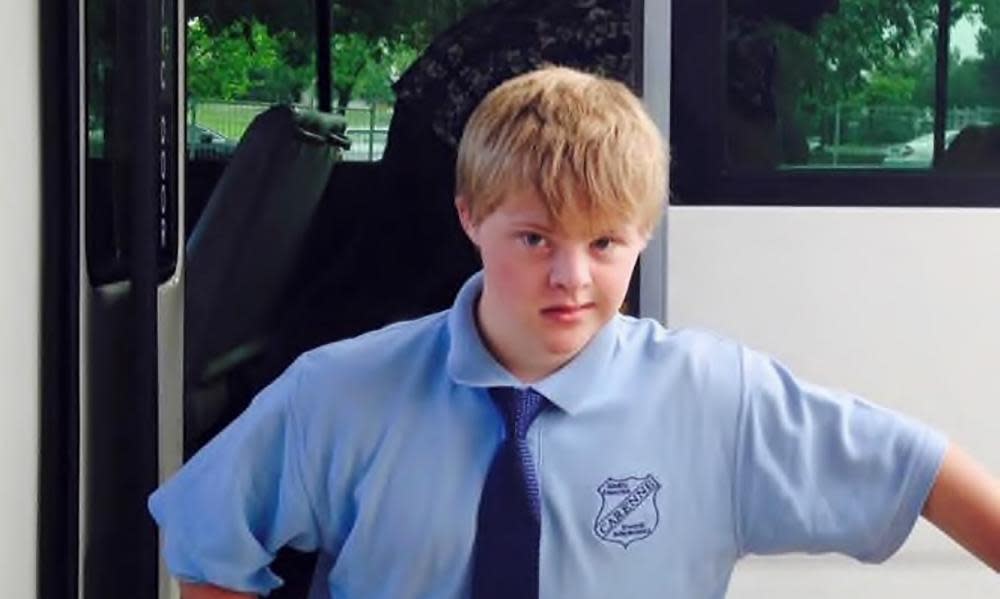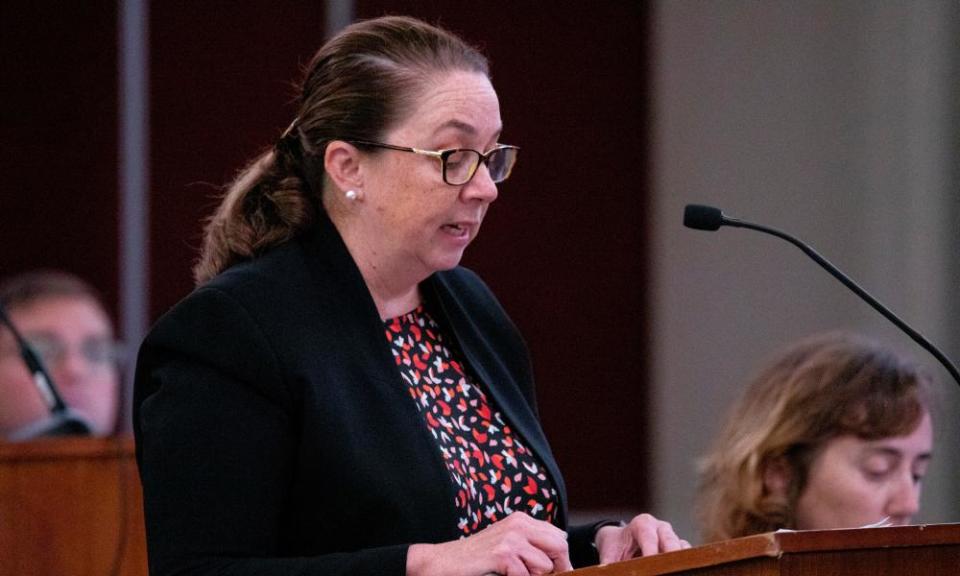‘Mum, I want to go home’: parents say health system is failing disabled children

Rachel Browne was choking back tears as she remembered how her son’s life slipped away.
“He kept saying ‘Mum, I want to go home’,” she told the disability royal commission this week. “He wanted to go back to school. I wanted to get him home. But it became evident that if he did recover he would have no quality of life.”
On 10 December 2016, 16-year-old Finlay finally did leave Sydney’s Westmead hospital. “I said to Fin ‘I’m taking you home today’,” Browne said. “He said ‘yes Mum’. He died that day with his siblings, myself and my husband all there with him.”
Browne, who is a nurse, recounted the tragic lead-up to her son’s death at this week’s hearings, which are examining the experiences of people with cognitive disability in the healthcare system.
Related: NDIS watchdog is fielding nearly 100 allegations of abuse or neglect a week
Opening the session, chair Ronald Sackville said the neglect and abuse experienced by those living with cognitive disabilities should “shock the conscience of all Australians”.
He added that the commission would hear about the huge gulf in life expectancy between people with an intellectual disability and the general population.
Those in NSW with an intellectual disability lived to an median age of 54, compared with 81 for the general population.
Browne told of the dismissive treatment that Finlay, who lived with Down syndrome, had faced as he battled the serious bowel obstruction that would eventually take his life.
When she arrived at the emergency department at Bathurst hospital, Browne immediately became anxious about the treatment Finlay was going to receive.

“I was holding him up and he collapsed onto the ground into a prone position on his stomach,” Browne said. “The triage nurse, when I looked up, rolled her eyes, and I thought, ‘That’s it. We’re not going to get the help we need.’”
Once Finlay was admitted, a CT scan had revealed an intestinal obstruction. Finlay was taken into theatre and Browne said she was led to believe her son would be airlifted to Westmead that night.
But he wasn’t. Browne was worried about a “distinct lack of urgency”. Finlay arrived at Westmead the next morning. He would spend the next 71 days there; 65 of them in paediatric intensive care.
Choking back tears, Browne told the commission how, as Finlay became sicker, “his ability to make himself heard improved”. “Finlay fought on for 71 more days,” she said. “No one expected that.”
Browne is now fighting for a coronial inquest into Finlay’s death and is awaiting the outcome.
Toowoomba woman Toni Mitchell recalled that her difficulties navigating the health system as the mother of a child with disabilities began before her child was even born.
When she had an ultrasound in 2000, she was told that her baby had a heart condition and she would probably miscarry in the next few weeks.
She was also told “it’s highly likely your son has Down’s syndrome”. Mitchell added: “… I was still crying. And he finally turned around. He said, ‘So here’s your appointment for a termination.’ Gave me a piece of paper and walked out. Everybody else walked out.
“And that was our introduction to it. And it set the whole tone for Joshy’s life. Because in that moment they completely disallowed his life. They said he wasn’t worth living.”
Mitchell told the hearing she threw the paper in the bin. Joshua joined his mother at the royal commission this week.
Related: In traditional language, there is no word for disability | Damian Griffis for IndigenousX
Prof Julian Trollor from UNSW told the commission he estimated that about 400 Australians die annually from a potentially avoidable death.
UNSW research found 38% of deaths of those with a cognitive disability were from potentially avoidable causes, twice as likely as in the general population.
“I know the commissioners have heard quite significant stories and understood them and their impact on people with disability and their families,” he said.
“Of every one person who has a tragic outcome of death that the commission will hear, there are many more nationally.”
The healthcare system was not equipped to adequately care for people with cognitive disabilities, Trollor said.
“This lack of preparedness manifests on every level – primary, specialist and acute care settings – and in services across the lifespan, from childhood to later life,” he said.
The commission also heard from Kim Creevey, whose son died in 2015, and Sydney woman and advocate Kylie Scott, who gave evidence about how how doctors should communicate with people with intellectual disability.
The #DisabilityRC hearing in Sydney has resumed. The first person we’ll hear from is Sydney woman Kylie Scott. She will tell the Royal Commission how doctors should communicate with people with intellectual disability. pic.twitter.com/en9XROMkAw
— Disability Royal Commission (@DRC_AU) February 18, 2020
Scott said it helped her when doctors asked short questions in plain English, spoke clearly, were patient and helped build trust with their patients.
Scott also drew attention to assess the mental health and wellbeing of people with Down’s syndrome and for doctors to be across current research.
“I want to speak up for people who can’t speak up,” she told the commission. “We all need to be understood and supported.”
Creevey told the commission that a paediatrician had questioned her about the cost of keeping her son alive.
Her son had been hospitalised and the paediatrician had assumed that his breathing difficulties were related to his disability. It turned out they were caused by acid reflux.
Related: The land the NDIS forgot: the remote Indigenous communities losing the postcode lottery
“He was very quick, like I said, to point out it was Harri’s disability. It wasn’t anything else,” he said.
“And while he was standing over Harri’s bed, who can understand and hear everything that’s going on, he said, ‘How much more money are we going to spend on him keeping him alive? You know, do you have an end of life plan for him?
“That had other consequences by way of we couldn’t go back to that hospital because he was the paediatrician that would have been allocated to Harrison. Yes, and then we had to spend a lot of time talking Harri through what he’d actually said.”
The counsel assisting Kate Eastman said the case showed the unconscious bias experienced by people with disabilities within the health system.
Mitchell told the commission her son Josh had been cleared of Hirschsprung disease – a congenital condition that causes problems with passing faeces.
One specialist blamed his chronic constipation to him being “lazy” and having low muscle tone as a result of his Down’s syndrome.
They later learned he had the condition. Mitchell said her son had lived in agony for 14 years due to the misdiagnosis. “He had no life. He couldn’t move, he couldn’t eat,” she said.
Earlier, Browne recalled another occasion when she felt an emergency room doctor dismissed Finlay as a “whingy child”.
She has kept the discharge summary she received that day. “It referred to Finlay as a grizzly child with Down’s syndrome who had poor dental hygiene,” Browne said.
His birth certificate, too, still causes her distress. His Down’s syndrome is among the listed causes of his death.
Browne told the commission that she did not believe it should be ordinary for a person’s intellectual disability to be listed on their death certificate if it was not part of the cause of their death.
As the commission extended its thanks and condolences to Browne, she asked to add one more thought to her evidence.
“Just in closing, I think a famous Australian ophthalmologist, John Colvin, once said that more is missed in medicine by not seeing and not knowing,” she said.
“I think that summarises what has happened to Finlay. And I hope that everyone sees him now.”
The commission will continue in Sydney next week.

 Yahoo News
Yahoo News 
